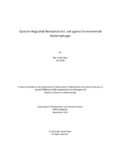Quorum regulated resistance of E. coli against environmental bacteriophages

View/
Date
2019-09Publisher
Brac UniversityAuthor
Khan, Md. ArafatMetadata
Show full item recordAbstract
Predation of bacteria by their corresponding phages have a significant influence on the population structure of different communities of bacteria. E. coli infection has become a safety concern globally and they are causing a multitude of problems from food borne diseases to systemic infections. The E. coli cells interact with E. coli phages present in the aquatic systems and also in the GI system of humans and many mammalian species where they reside either during an infection or as a symbiotic or opportunistic microbe. As the E. coli cells survive phage predation in their habitats, there must be some underlying mechanisms which they resort to, to exist along with the phages present in the environment or evade infection. However, these techniques employed might hamper their ecological fitness and they may not be a permanent mutation and these cells might just revert back to their previous form when an environmental or chemical signal is sensed. In this experiment autoinducer molecules which are involved in bacterial quorum sensing were used to study phage bacterial interaction and it was found that growing E. coli cells in the presence of autoinducer AI-2 can significantly make them resistant to their corresponding phages than their parent strain. On the other hand, autoinducer CAI-1 seemed to have no effect on phage predation of E. coli bacterial species. Moreover, after culturing the E. coli bacterial cells in presence of exogenous autoinducer AI-2 there was a huge reduction in percentage of phage adsorption which might be due to downregulation of the receptors being used by the phage. All these results further prove the distinct effects of quorum sensing and will help scientists to formulate treatment strategies using Bacteriophages.
